|
Books Should Be Free Loyal Books Free Public Domain Audiobooks & eBook Downloads |
|
|
Books Should Be Free Loyal Books Free Public Domain Audiobooks & eBook Downloads |
|
Non-fiction |
|---|
|
Book type:
Sort by:
View by:
|
By: John Bunyan (1628-1688) | |
|---|---|
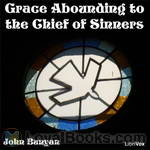 Grace Abounding to the Chief of Sinners
Grace Abounding to the Chief of Sinners
Grace Abounding is the spiritual autobiography of John Bunyan, who also penned Pilgrim’s Progress, perhaps one of the most significant pieces of Christian literature, second only to the Bible. Grace Abounding follows Bunyan’s struggle to find true repentance and forgiveness, his battle with Satan’s temptations of unbelief, his comfort found in the Bible and his overarching victory gotten by the grace of God through Jesus Christ his Son. Readers familiar with Pilgrim’s Progress will recognize... | |
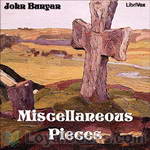 Miscellaneous Pieces
Miscellaneous Pieces
John Bunyan (November 28, 1628 – August 31, 1688), a Christian writer and preacher, was born at Harrowden (one mile south-east of Bedford), in the Parish of Elstow, England. He wrote The Pilgrim’s Progress, arguably the most famous published Christian allegory. In the Church of England he is remembered with a Lesser Festival on 30 August. Bunyan became a popular preacher as well as a prolific author, though most of his works consist of expanded sermons. In theology he was a Puritan, but there was nothing gloomy about him. The portrait his friend Robert White drew, which has often been reproduced, shows the attractiveness of his true character. | |
By: John Milton (1608-1674) | |
|---|---|
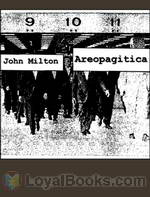 Areopagitica
Areopagitica
A prose tract or polemic by John Milton, published November 23, 1644, at the height of the English Civil War… Milton, though a supporter of the Parliament, argued forcefully against the Licensing Order of 1643, noting that such censorship had never been a part of classical Greek and Roman society. The tract is full of biblical and classical references which Milton uses to strengthen his argument. The issue was personal for Milton as he had suffered censorship himself in his efforts to publish... | |
By: Helen Keller (1888-1968) | |
|---|---|
 The Story of My Life
The Story of My Life
An autobiography of Helen Keller published when the author was still in her early 20's. The narrative reveals how her mind developed and matured until she began her studies at Radcliffe College | |
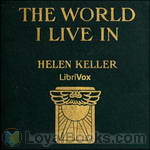 The World I Live In
The World I Live In
The World I Live In by Helen Keller is a collection of essays that poignantly tells of her impressions of the world, through her sense of touch, smell, her imagination and dreams. My hand is to me what your hearing and sight together are to you. In large measure we travel the same highways, read the same books, speak the same language, yet our experiences are different. All my comings and goings turn on the hand as on a pivot. It is the hand that binds me to the world of men and women. The hand is my feeler with which I reach through isolation and darkness and seize every pleasure, every activity that my fingers encounter... | |
By: Benjamin Franklin (1706-1790) | |
|---|---|
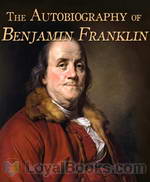 The Autobiography of Benjamin Franklin
The Autobiography of Benjamin Franklin
Inventor, author, printer, scientist, politician, diplomat—all these terms do not even begin to fully describe the amazing and multitalented, Benjamin Franklin who was of course also one of the Founding Fathers of America. At the age of 75, in 1771 he began work on what he called his Memoirs. He was still working on it when he died in 1790 and it was published posthumously, entitled An Autobiography of Benjamin Franklin. The book had a complicated and controversial publication history. Strangely enough, the first volume only was first published in French, in Paris in 1791... | |
By: Confucius (551-479 BC) | |
|---|---|
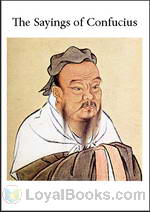 The Sayings of Confucius
The Sayings of Confucius
A treasure trove of wise and pithy sayings, reflections on education, family values, the ideal human being, life and living, politics, art, culture and timeless wisdom, The Sayings of Confucius is indeed an invaluable addition to your bookshelf. Ever since Chinese literary works first began to be translated into European languages, the works of the legendary Chinese philosopher and teacher Confucius, who lived in present day Qufu in the Shandong province of China, more than two thousand years ago, have held universal appeal... | |
By: Zane Grey (1872-1939) | |
|---|---|
 The Last of the Plainsmen
The Last of the Plainsmen
Travel along as Mike Vendetti aka miketheauctioneer narrates an outstanding true account of a trip made in 1909 by Zane Grey and a plainsman, Buffalo Jones, through the Grand Canyon to lasso a cougar. That’s right lasso. Throw a rope around. That’s equivalent to catching one by the tail. As I narrated this book, I found fact to be as exciting as fiction. This part of the west was relatively wild and untamed at this time. Wolves, wild horses, buffalo and other wildlife were quite prevalent, and the Indians were not that friendly... | |
 Tales of Fishes
Tales of Fishes
| |
By: Andrew Lang | |
|---|---|
 A Short History of Scotland
A Short History of Scotland
A Short History of Scotland is a consise introduction to the history of Scotland from Roman times to the last Jacobite rebellion, written by the author of a much longer Scottish history. | |
 Angling Sketches
Angling Sketches
| |
 Introduction to the Compleat Angler
Introduction to the Compleat Angler
| |
 Oxford
Oxford
| |
By: René Descartes (1596-1650) | |
|---|---|
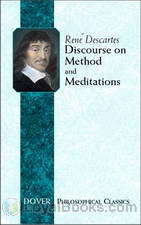 Discourse on the Method of Rightly Conducting One's Reason and of Seeking Truth in the Sciences
Discourse on the Method of Rightly Conducting One's Reason and of Seeking Truth in the Sciences
The Discourse on Method is best known as the source of the famous quotation “cogito ergo sum”, “I think, therefore I am.” …. It is a method which gives a solid platform from which all modern natural sciences could evolve. With this work, the idea of skepticism was revived from the ancients such as Sextus Empiricus and modified to account for a truth that Descartes found to be incontrovertible. Descartes started his line of reasoning by doubting everything, so as to assess the world from a fresh perspective, clear of any preconceived notions. | |
By: Immanuel Kant (1724-1804) | |
|---|---|
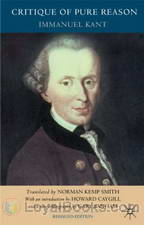 The Critique of Pure Reason
The Critique of Pure Reason
The Critique of Pure Reason, first published in 1781 with a second edition in 1787, has been called the most influential and important philosophical text of the modern age. Kant saw the Critique of Pure Reason as an attempt to bridge the gap between rationalism (there are significant ways in which our concepts and knowledge are gained independently of sense experience) and empiricism (sense experience is the ultimate source of all our concepts and knowledge) and, in particular, to counter the radical empiricism of David Hume (our beliefs are purely the result of accumulated habits, developed in response to accumulated sense experiences)... | |
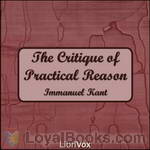 The Critique of Practical Reason
The Critique of Practical Reason
The Critique of Practical Reason (Kritik der praktischen Vernunft) is the second of Immanuel Kant’s three critiques, first published in 1788. It follows on from his Critique of Pure Reason and deals with his moral philosophy. The second Critique exercised a decisive influence over the subsequent development of the field of ethics and moral philosophy, becoming the principle reference point for ethical systems that focus on the rightness or wrongness of actions themselves, as opposed to the rightness or wrongness of the consequences of those actions... | |
By: Ralph Waldo Emerson | |
|---|---|
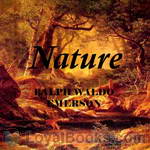 Nature
Nature
“Nature” is a short essay by Ralph Waldo Emerson published anonymously in 1836. It is in this essay that the foundation of transcendentalism is put forth, a belief system that espouses a non-traditional appreciation of nature. Recent advances in zoology, botany, and geology confirmed Emerson’s intuitions about the intricate relationships of nature at large. The publication of “Nature” is usually taken to be the watershed moment at which transcendentalism became a major cultural movement... | |
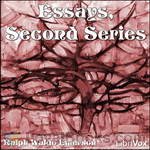 Essays, Second Series
Essays, Second Series
Ralph Waldo Emerson (1803 – 1882) was an American essayist, philosopher, and poet, best remembered for leading the Transcendentalist movement of the mid 19th century. His teachings directly influenced the growing New Thought movement of the mid-1800s. | |
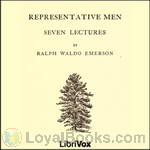 Representative Men
Representative Men
A series of biographical lectures originally published in 1850. Each chapter is a philosophical treatment of the life of an intellectual. The six representatives are Plato, Swedenborg, Shakespeare, Montaigne, Napolean and Goethe. (Introduction by S. Kovalchik) | |
By: Sigmund Freud (1856-1939) | |
|---|---|
 Dream Psychology
Dream Psychology
From the dawn of human consciousness, dreams have always fascinated us. Do they mean something? Do dreams help us see into the future? These questions have intrigued us for centuries. Sigmund Freud was one of the first people to examine dreams seriously and interpret them in the context of our waking lives. In Dream Psychology: Psychoanalysis for Beginners, the Austrian psychoanalyst, Dr Sigmund Freud shares his exciting early discoveries that there was indeed a connection between his patients' dreams and their mental disturbances... | |
 Reflections on War and Death
Reflections on War and Death
Anyone, as Freud tells us in Reflections on War and Death, forced to react against his own impulses may be described as a hypocrite, whether he is conscious of it or not. One might even venture to assert—it is still Freud’s argument—that our contemporary civilisation favours this sort of hypocrisy and that there are more civilised hypocrites than truly cultured persons, and it is even a question whether a certain amount of hypocrisy is not indispensable to maintain civilisation. When this... | |
By: Albert Einstein (1879-1955) | |
|---|---|
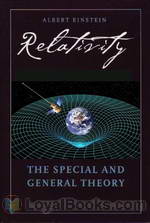 Relativity: The Special and General Theory
Relativity: The Special and General Theory
Einstein wrote this book for people who are interested in understanding the Theory of Relativity but aren't experts in scientific and mathematical principles. I'm sure many people have heard about Einstein's Theory of Relativity, but most of them don't really know what it is all about. This book gives them a chance to know more about this very famous theory without the need to take a Physics course first. This book is divided into three parts. The first part explains what special relativity is all about... | |
 Sidelights on Relativity
Sidelights on Relativity
Sidelights on Relativity contains ETHER AND THE THEORY OF RELATIVITY, an address delivered on May 5th, 1920, in the University of Leyden; and GEOMETRY AND EXPERIENCE, an expanded form of an address to the Prussian Academy of Sciences in Berlin on January 27th, 1921. (Intro from Project Gutenberg) | |
By: Founding Fathers of the United States | |
|---|---|
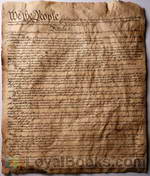 The Constitution of the United States of America, 1787
The Constitution of the United States of America, 1787
The Declaration of Independence was signed on July 4, 1776. It announced that the thirteen American colonies, who were at war with Great Britain in the American Revolutionary War, no longer considered themselves part of the British Empire. They now called themselves a new nation, The United States of America. This famous document went on to become a well-known keystone of the human rights movement. However, the newly formed state had no real identity or philosophy and were merely a loose collection of states that had freed themselves from colonial rule... | |
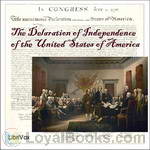 The Declaration of Independence of the United States of America
The Declaration of Independence of the United States of America
Declaration of Independence is the document in which the Thirteen Colonies declared themselves independent of the Kingdom of Great Britain and explained their justifications for doing so. It was ratified by the Continental Congress on July 4, 1776. | |
By: Johanna Spyri (1827-1901) | |
|---|---|
 Heidi (version 2 dramatic reading)
Heidi (version 2 dramatic reading)
"Heidi" takes us on a journey to the eventful childhood of a good-hearted girl from the Swiss Alps. A warm and loving story, full of touching moments, it reaches children and adults alike. It was written in 1880 and published in two parts: 1. Heidi's years of learning and travel. 2. Heidi makes use of what she has learned. This English translation from 1915 has "an especial flavor, that very quality of delight in mountain scenes, in mountain people and in child life generally, which is one of the chief merits of the German original... | |
By: Gene Stratton-Porter (1863-1924) | |
|---|---|
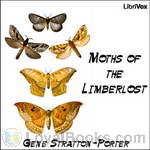 Moths of the Limberlost
Moths of the Limberlost
Gene Stratton-Porter was an American author, amateur naturalist, wildlife photographer, specializing in the birds and moths in one of the last of the vanishing wetlands of the lower Great Lakes Basin. The Limberlost and Wildflower Woods of northeastern Indiana were the laboratory and inspiration for her stories, novels, essays, photography, and movies. She was an accomplished author, artist and photographer and is generally considered to be one of the first female authors to promulgate public positions; conserving the Limberlost Swamp in her case... | |
By: Robert Michael Ballantyne (1825-1894) | |
|---|---|
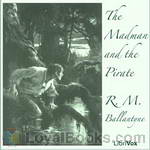 The Madman And The Pirate
The Madman And The Pirate
R. M. Ballantyne (April 24, 1825 – February 8, 1894) was a Scottish juvenile fiction writer. Born Robert Michael Ballantyne in Edinburgh, he was part of a famous family of printers and publishers. At the age of 16 he went to Canada and was six years in the service of the Hudson’s Bay Company. He returned to Scotland in 1847, and published his first book the following year, Hudson’s Bay: or, Life in the Wilds of North America. For some time he was employed by Messrs Constable, the publishers, but in 1856 he gave up business for the profession of literature, and began the series of adventure stories for the young with which his name is popularly associated. | |
By: Garrett P. Serviss (1851-1929) | |
|---|---|
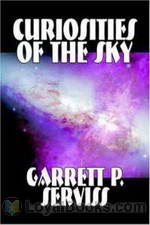 Curiosities of the Sky
Curiosities of the Sky
Is there intelligent life on Mars? Why are there starless gaps in the Milky Way? What creates the Aurora Borealis or the Northern Lights? These and more are the interesting questions that are asked and sought to be answered in the 1909 book, Curiosities of the Sky by Garrett P. Serviss. Garrett Putnam Serviss was an American astronomer and popular sci-fi writer. He believed that science should be understood and enjoyed by everyone, not just by scientists. Though he was trained as a lawyer, he went to work as a newspaper reporter with The New York Sun in 1867... | |
By: John Muir (1838-1914) | |
|---|---|
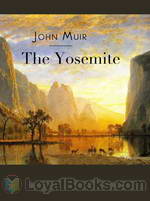 The Yosemite
The Yosemite
Anyone who's ever visited the Yosemite National Park will find this book a treasure trove of descriptions, information and evocations of the fabled beauty of this amazing piece of heaven on earth! The Yosemite by John Muir was published in 1912. Born in Scotland, England, this world-famous conservationist was a multi-talented genius. He was a geologist, naturalist, engineer, writer, botanist and a passionate and prolific writer on the preservation of the natural environment. His family migrated to America when he was just a few years old, the third of eight boisterous children... | |
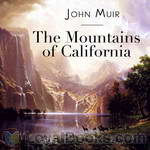 The Mountains of California
The Mountains of California
First published in 1894, this wonderful travelogue by a famed naturalist and conservationist still remains a book that delights and informs its readers. The Mountains of California by John Muir recounts the author's exploration of the Yosemite Valley, Mount Whitney, the famed sequoia forests and King's Canyon among other places of immense natural beauty. Written in his characteristic zestful style, with a deep understanding and respect for nature, the book is a treasure trove of geography, geology, botany, biology and sheer love of the magical planet we live in... | |
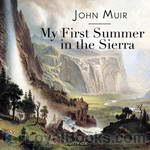 My First Summer in the Sierra
My First Summer in the Sierra
The journal of nature-lover John Muir who spent the summer of 1869 walking California’s Sierra Nevada range. From French Bar to Mono Lake and the Yosemite Valley, Muir was awestruck by everything he saw. The antics of the smallest “insect people” amazed him as much as stunted thousand-year old Juniper trees growing with inconceivable tenacity from tiny cracks in the stone. Muir spent the rest of his life working to preserve the high Sierra, believing that “the clearest way into the Universe is through a forest wilderness.” John Muir (1838-1914) was born in Dunbar, Scotland and grew up in Wisconsin, USA. This recording commemorates the 140th anniversary of that first summer. | |
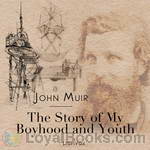 The Story of My Boyhood and Youth
The Story of My Boyhood and Youth
“The only fire for the whole house was the kitchen stove, with a fire box about eighteen inches long and eight inches wide and deep,- scant space for three or four small sticks, around which in hard zero weather all the family of ten shivered, and beneath which in the morning we found our socks and coarse, soggy boots frozen solid.” Thus, with perceptive eye for detail, the American naturalist, John Muir, describes life on a pioneer Wisconsin farm in the 1850’s. Muir was only eleven years old when his father uprooted the family from a relatively comfortable life in Dunbar, Scotland, to settle in the backwoods of North America... | |
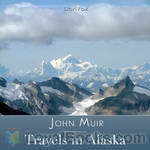 Travels in Alaska
Travels in Alaska
In 1879 John Muir went to Alaska for the first time. Its stupendous living glaciers aroused his unbounded interest, for they enabled him to verify his theories of glacial action. Again and again he returned to this continental laboratory of landscapes. The greatest of the tide-water glaciers appropriately commemorates his name. Upon this book of Alaska travels, all but finished before his unforeseen departure, John Muir expended the last months of his life. | |
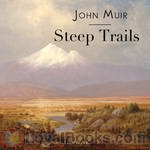 Steep Trails
Steep Trails
A collection of Muir's previously unpublished essays, released shortly after his death. "This volume will meet, in every way, the high expectations of Muir's readers. The recital of his experiences during a stormy night on the summit of Mount Shasta will take rank among the most thrilling of his records of adventure. His observations on the dead towns of Nevada, and on the Indians gathering their harvest of pine nuts, recall a phase of Western life that has left few traces in American literature... | |
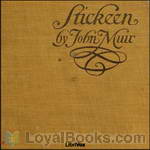 Stickeen
Stickeen
A great dog story, a well told tale — the naturalist and adventurer John Muir recounts how he and his companion, a dog named Stickeen, each, alone, confronted and conquered their fears of an icy Alaskan glacier in 1880. | |
By: John Galsworthy (1867-1933) | |
|---|---|
 John Galsworthy Works
John Galsworthy Works
| |
By: William E. B. Du Bois (1868-1963) | |
|---|---|
 The Souls of Black Folk
The Souls of Black Folk
“Few books make history and fewer still become the foundational texts for the movements and struggles of an entire people....” One such great work was The Souls of Black Folk by William EB Du Bois. Published in 1903, it is a powerful and hard-hitting view of sociology, race and American history. It became the cornerstone of the civil rights movement and when Du Bois attended the first National Negro Conference in 1909, he was already well-known as a proponent of full and unconditional equality for African Americans... | |
By: Gustave Flaubert (1821-1880) | |
|---|---|
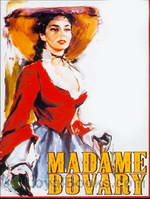 Madame Bovary
Madame Bovary
The strands woven together in Gustave Flaubert's famous, path breaking 1856 novel Madame Bovary include a provincial town in Normandy, France, a shy young doctor with an indifferent career and a lovely young woman who lives in a fantasy world based on the innumerable romantic novels she reads. Of course there is also the story of a dull marriage punctuated by passionate, adulterous love affairs. First published in serial form in a Parisian magazine and deemed to be the “perfect” novel, Flaubert's debut was received by both readers and critics with acclaim and admiration... | |
By: John Donne (1572-1631) | |
|---|---|
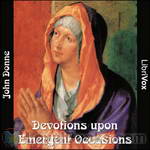 Devotions upon Emergent Occasions
Devotions upon Emergent Occasions
Devotions upon Emergent Occasions is a 1624 prose work by the English writer John Donne. It is a series of reflections that were written as Donne recovered from a serious illness, believed to be either typhus or relapsing fever. (Donne does not clearly identify the disease in his text.) The work consists of twenty-three parts describing each stage of the sickness. Each part is further divided into a Meditation, an Expostulation, and a Prayer. The seventeenth meditation is perhaps the best-known part of the work... | |
By: William Makepeace Thackeray (1811-1863) | |
|---|---|
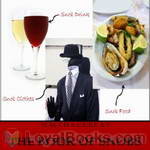 The Book of Snobs
The Book of Snobs
The necessity of a work on Snobs, demonstrated from History, and proved by felicitous illustrations:—I am the individual destined to write that work—My vocation is announced in terms of great eloquence—I show that the world has been gradually preparing itself for the WORK and the MAN—Snobs are to be studied like other objects of Natural Science, and are a part of the Beautiful (with a large B). They pervade all classes—Affecting instance of Colonel Snobley. | |
By: Joseph Trienens (b. 1863) | |
|---|---|
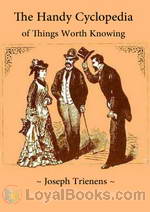 The Handy Cyclopedia of Things Worth Knowing
The Handy Cyclopedia of Things Worth Knowing
Written in 1910, this “cyclopedia” is full of information that was quite useful at the time. A hundred years later, its text is more humorous than practical — although some advice never goes out of style. | |
By: Ambrose Bierce (1842-1914?) | |
|---|---|
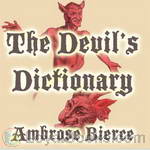 The Devil's Dictionary
The Devil's Dictionary
RESPECTABILITY, n. The offspring of a liaison between a bald head and a bank account. BEAUTY, n. The power by which a woman charms a lover and terrifies a husband. LITIGANT, n. A person about to give up his skin for the hope of retaining his bones. If these caustic definitions catch your fancy, you'd enjoy The Devil's Dictionary by Ambrose Bierce. He was a columnist with the San Francisco News Letter, a weekly paper which was a business publication aimed at the corporate sector. However, it had a column entitled Town Crier which featured satirical asides and comments in a lighter vein... | |
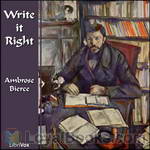 Write it Right
Write it Right
Witty, opinionated alphabetical examples of what Bierce considered poor (American) English and advice on alternatives – entertaining, thought-provoking, occasionally outdated but so interesting to see how style and taste have changed. | |
By: Hendrik van Loon | |
|---|---|
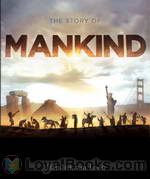 The Story of Mankind
The Story of Mankind
A book that won the Newberry Prize in 1921 for an Outstanding Contribution in Children's Literature, The Story of Mankind, by Hendrik van Loon is indeed a classic that has been enjoyed by generations of children and adults. The book is an engagingly written work, dedicated to the author Hendrik van Loon's two young son's Hansje and Willem. It was created to convey the history of the human race to young people in a way that was interesting, memorable and would spur them onto further research and reading into the subject... | |
By: Olive Green | |
|---|---|
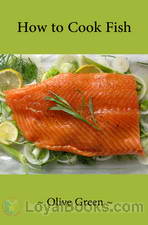 How to Cook Fish
How to Cook Fish
One hundred simple fish sauces. Sixty-five ways to cook mackerel. The Catching of Unshelled Fish. Twenty-seven ways to Cook Frogslegs. Now that should certainly make you reach for your apron and fish knife! How to Cook Fish by Olive Green is a vintage culinary classic, filled with simple, easy to follow recipes rendered in a terse, no nonsense style. There's none of this fiddling with scales, weights and measures. What you get is a mélange of interesting, unusual ways to cook seafood without worrying about lists of ingredients, timings, temperature or any of the conventions followed by traditional cookbooks... | |
By: Vachel Lindsay (1879-1931) | |
|---|---|
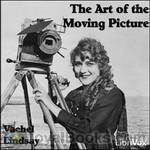 The Art of the Moving Picture
The Art of the Moving Picture
"This 1922 book by poet and sometime cultural critic Vachel Lindsay might have been the first to treat the then-new medium of moving pictures as an art form, one that was potentially as rich, complex, mysterious as far older ones, and whose physical and aesthetic properties were only starting to be understood. The highlight of the book might be “The Motion Picture of Fairy Splendor,” which examines the relationship between film storytelling, magic, myths, legends and bedtime stories. It’s discombobulating, in a good way, to read Lindsay’s attempts to grapple with what, precisely, cinema is... | |
By: John Stuart Mill (1806-1873) | |
|---|---|
 On Liberty
On Liberty
Published in 1859, On Liberty is a libertarian philosophical work by English philosopher John Stuart Mill that endorses his view on the importance of individuality for the constant progression and improvement of society. The work also supports economic and moral freedom, and openly criticizes the influence of social authority that in one way or another imposes a predefined set of acceptable attitudes and opinions. Highlighting issues including the incongruity between authority and liberty, the oppressive... | |
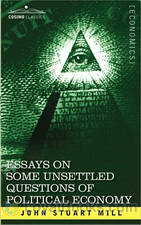 Essays on Some Unsettled Questions of Political Economy
Essays on Some Unsettled Questions of Political Economy
This is Mill’s first work on economics. It foreshadows his Political Economy which was the standard Anglo-American Economics textbook of the late 19th and early 20th centuries. Mill’s economic theory moved from free market capitalism, to government intervention within the precepts of Utilitarianism, and finally to Socialism. | |
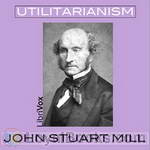 Utilitarianism
Utilitarianism
John Stuart Mill’s book Utilitarianism is one of the most influential and widely-read philosophical defenses of utilitarianism in ethics. The essay first appeared as a series of three articles published in Fraser’s Magazine in 1861; the articles were collected and reprinted as a single book in 1863. It went through four editions during Mill’s lifetime with minor additions and revisions. Although Mill includes discussions of utilitarian ethical principles in other works such as On Liberty and The Subjection of Women, Utilitarianism contains Mill’s only major discussion of the fundamental grounds for utilitarian ethical theory. | |
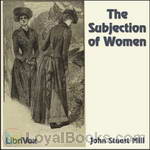 The Subjection of Women
The Subjection of Women
The Subjection of Women is the title of an essay written by John Stuart Mill in 1869, possibly jointly with his wife Harriet Taylor Mill, stating an argument in favor of equality between the sexes. It offers both detailed argumentation and passionate eloquence in opposition to the social and legal inequalities commonly imposed upon women by a patriarchal culture. Just as in “On Liberty,” Mill defends the emancipation of women on utilitarian grounds, convinced that the moral and intellectual advancement of women would result in greater happiness for everybody. | |
 Considerations on Representative Government
Considerations on Representative Government
Mill's volume was published in 1861 as an argument favoring this form of governance. Mill covers what forms of government work best, including when representative government is applicable and when not. He details appropriate functions of representative bodies and warns of problems to avoid. He distinguishes between true and false democracy. Other areas covered include how voting is carried out, the role of a second chamber in Parliament, and how an executive branch might function. | |
 Auguste Comte and Positivism
Auguste Comte and Positivism
Part 1 lays out the framework for Positivism as originated in France by Auguste Comte in his Cours de Philosophie Positive. Mill examines the tenets of Comte's movement and alerts us to defects. Part 2 concerns all Comte's writings except the Cours de Philosophie Positive. During Comte's later years he gave up reading newspapers and periodicals to keep his mind pure for higher study. He also became enamored of a certain woman who changed his view of life. Comte turned his philosophy into a religion, with morality the supreme guide. Mill finds that Comte learned to despise science and the intellect, instead substituting his frantic need for the regulation of change. | |
By: Sir John Barrow (1764-1848) | |
|---|---|
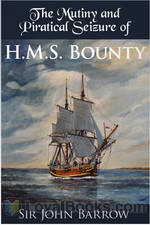 Eventful History of the Mutiny and Piratical Seizure of H.M.S. Bounty
Eventful History of the Mutiny and Piratical Seizure of H.M.S. Bounty
On December 31 1787, the HMS Bounty, a small sailing vessel embarked from Spithead Harbor, England bound for Tahiti. Her mission was sponsored by the Royal Society in London and aimed at picking up breadfruit plants and fruit from Tahiti and conveying them to the West Indies, where it was hoped they would take root and become a commercial crop. The Bounty was an old ship with a young captain and 46 young officers. The captain's cabin was converted into a potting shed for the expected breadfruit cargo... | |
By: Adam Smith (1723-1790) | |
|---|---|
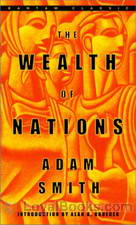 The Wealth of Nations
The Wealth of Nations
Adam Smith’s “The Wealth of Nations” gives an in-depth discussion of different economic principles like the productivity, division of labor and free markets. Although written and published more than 200 years ago, it’s still hailed as one of the most original works in the field of economics and is still used as a reference by many modern economists. “An Inquiry Into the Nature and Causes of the Wealth of Nations” is the complete title of this book and it was first published in 1776, the same year that the American colonies declared their independence from Britain... | |
By: Bill Nye | |
|---|---|
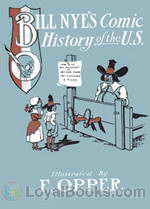 Comic History of the United States
Comic History of the United States
For American journalist and humorist Edgar Wilson Nye who wrote under the pen name Bill Nye in the late 19th century, facts are not to be presented in their newborn, bare state. They should be properly draped and embellished before they can be presented before the public. Hence, in the Comic History of the United States published in 1894, he gives his readers the facts. But in a bid to make the historical figures more human he describes them as “people who ate and possibly drank, people who were born, flourished and died, not grave tragedians posing perpetually for their photographs... | |
 Comic History of England
Comic History of England
If you thought history was dull, dry and boring, you haven't read Bill Nye's books! He brings wit, humor, satire, irony and sheer nonsensical fun into the subject, making it both entertaining and memorable. The Comic History of England was published posthumously in 1896 after the writer's tragic and untimely death half-way through the project. Hence it remains incomplete and covers the history of the island nation only up to the Tudor period. However, beginning with Julius Caesar, the Roman invasion of Britain, the Druids and Stonehenge, this book is still a rib-tickling ride through the centuries... | |
By: Patrick Henry (1736-1799) | |
|---|---|
 Give Me Liberty or Give Me Death
Give Me Liberty or Give Me Death
This speech was given March 23, 1775, at St. John’s Church in Richmond, Virginia, and is credited with having singlehandedly convinced the Virginia House of Burgesses to pass a resolution delivering the Virginia troops to the Revolutionary War. In attendance were Thomas Jefferson and George Washington. Reportedly, the crowd, upon hearing the speech, jumped up and shouted, “To Arms! To Arms!” | |
By: Susanna Moodie (1803-1885) | |
|---|---|
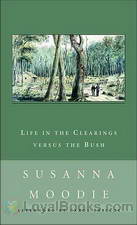 Life in the Clearings
Life in the Clearings
If you've read Margaret Atwood's Alias Grace, the historical fiction novel that describes a gruesome double murder in Canada in 1843, you would be interested to know the sources that were used by Atwood during her research. Life in the Clearings by Susanna Moodie was one such reference book in which the author, Susanna Moodie recounts her meeting with the infamous murderess Grace Marks, a young house help who was convicted to life imprisonment for her role in the slaying of her employers. Susanna Moodie was an Englishwoman born in Suffolk... | |
 Roughing It in the Bush
Roughing It in the Bush
'Roughing It In the Bush' is Susanna Moodie's account of how she coped with the harshness of life in the woods of Upper Canada, as an Englishwoman homesteading abroad. Her narrative was constructed partly as a response to the glowing falsehoods European land-agents were circulating about life in the New World. Her chronicle is frank and humorous, and was a popular sensation at the time of its publication in 1852. | |